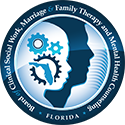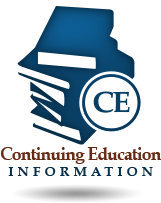HB 566 - Mental Heal Profession Licensure
Effective Date: Upon becoming law
HB 566 (Full Text)
Summary:
The bill amends the minimum educational requirements specified in section 491.004, Florida Statutes, for marriage and family therapy and mental health counseling licensure by examination. Marriage and family therapy applicants must graduate with a master’s degree from a Commission on Accreditation for Marriage and Family Therapy Education (COAMFTE) or a Council on Accreditation of Counseling and Related Educational Programs (CACREP)accredited program or complete a master’s degree at any institutionally accredited college or university with a major emphasis in marriage and family therapy or a closely related field with a degree conferred date prior to September 1, 2027. After September 1, 2027, applicants must have graduated from a COAMFTE or CACREP accredited program.
Existing statutory language requires that beginning July 1, 2025, mental health therapy licensure by examination applicants must graduate from a CACREP-accredited program. The bill added the accrediting body, “Masters in Psychology and Counseling Accreditation Council,” or other equivalent accrediting body to the list of accepted programs.
HB 1521 - Professional Counselors Licensure Compact
Effective Date: Upon becoming law
HB 1521 (Full Text)
Summary:
Effective upon enactment of the Professional Counselors Licensure Compact (compact) into law by 10 states, the bill enacts and authorizes Florida to join the compact. The bill requires the Board of Clinical Social Work, Marriage and Family Therapy, and Mental Health Counseling to appoint an individual to serve on the compact Commission. Upon enactment of the compact, the bill authorizes eligible Florida licensed mental health counseling practitioners to apply for licensure to provide services to out-of-state patients through either telehealth or in-person across compact states. Likewise, out-of-state licensed professional counselors in compact states will be authorized to provide services to Florida patients through telehealth and in-person. The bill exempts out-of-state licensed practitioners who practice under the compact from the licensure requirements in this state.
Additionally, the bill requires the Department of Health to report any significant investigation information relating to mental health counselors practicing under the compact to the established data system and authorizes the Board to take adverse action against a mental health counselor’s authority to practice under the compact and impose disciplinary actions for violation of prohibited acts. The bill requires mental health counselors practicing under the compact to withdraw from all practice under the compact if the mental health counselor is in an impaired practitioner program.
HB 1523 - Public Records and Meetings related to the Professional Counselors Licensure Compact
Effective Date: on the same date that HB 1521 takes effect
HB 1523 (Full Text)
Summary:
The bill provides an exemption from public records requirements for certain information held by the Department of Health or the Board of Clinical Social Work, Marriage and Family Therapy and Mental Health Counseling pursuant to the Professional Counselors Licensure Compact. The bill creates a public meeting exemption for a meeting or a portion of a meeting of the Commission at which matters specifically exempted from disclosure by federal or state law are discussed. The bill also creates a public meeting exemption where sensitive matters listed in the statute are addressed.
SB 768 - Florida Department of Health
SB 768 (Full Text)
Summary:
Section 22
Clinical Social Work, Marriage & Family Therapy, and Mental Health Counseling
The bill clarifies the method for registration, payment of fees, and completion of the national examination. Due to recent changes in accreditation nomenclature at the U.S. Department of Education, all accreditation references in this section were changed from “regionally” to “institutionally” accredited college or university.
The bill creates three pathways to licensure for applicants for a marriage and family therapy license to meet the minimum educational requirements by one of the following methods:
- A minimum of a master’s degree from a Commission on Accreditation for Marriage and Family Therapy Education (COAMFTE);
- A minimum of a master’s degree with an emphasis in marriage and family therapy from a college or university that is accredited by the Council on Accreditation of Counseling and Related Educational Programs (CACREP); or
- A minimum of a master’s degree with an emphasis in marriage and family therapy or a closely related field, with a degree conferred before September 1, 2027, from an institutionally accredited college or university.
The bill also updates the education requirements for marriage and family therapists by correcting an obsolete reference to accreditation by Commission on Recognition of Postsecondary Accreditation (CORPA), which was dissolved in 1997. The bill replaces the CORPA with the CHEA or its successors.
Existing statutory language requires that beginning July 1, 2025, mental health therapy licensure by examination applicants must graduate from a CACREP-accredited program. The bill adds the accrediting body, “Masters in Psychology and Counseling Accreditation Council,” or other equivalent accrediting body to the list of accepted programs.





